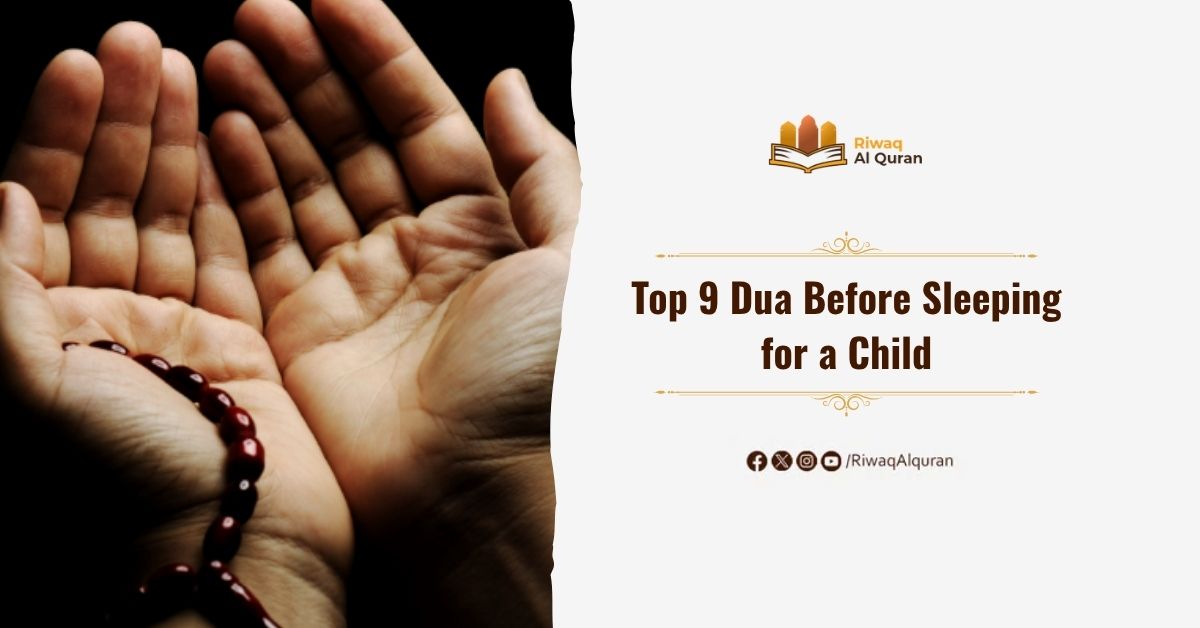Bedtime is more than just the end of a long day for your child—it’s a chance to wind down, reflect, and reconnect with Allah. As parents, one of the most comforting habits we can teach our children is turning to Allah before they sleep. Making dua before sleeping for a child not only offers spiritual protection but also instills a lifelong habit of faith, peace, and gratitude.
In this guide, we’ll explore the most powerful duas before sleeping for children, including what to recite, when to recite them, and how they strengthen your child’s connection with Allah. You’ll also find practical tips to help your child memorize and understand these beautiful supplications.
Here are several authentic and meaningful duas before sleeping for children that you can teach and recite with your child nightly:
Table of Contents
1. Dua for Protection and Peaceful Sleep
This simple dua was taught by the Prophet ﷺ and is perfect for children to say every night.
Arabic:
اللَّهُمَّ بِاسْمِكَ أَمُوتُ وَأَحْيَا
Transliteration:
Allāhumma bismika amūtu wa aḥyā
Translation:
O Allah, in Your name I die and I live.
(Bukhari 6324)
Say this with your child as they lay down, reminding them they sleep and wake by Allah’s will.
2. Dua for Protection from All Evil
This powerful dua seeks refuge in Allah from harm, nightmares, and Shaytan.
Arabic:
أَعُوذُ بِكَلِمَاتِ اللَّهِ التَّامَّاتِ مِنْ شَرِّ مَا خَلَقَ
Transliteration:
Aʿūdhu bikalimāti-llāhi at-tāmmāti min sharri mā khalaq
Translation:
I seek refuge in the perfect words of Allah from the evil of what He has created.
(Muslim 2708)
Recite this over your child at bedtime, especially if they fear the dark or have bad dreams.
3. Quranic Dua for Trust in Allah
This verse helps your child sleep peacefully, knowing Allah is protecting them.
Arabic:
حَسْبِيَ اللَّهُ لَا إِلَٰهَ إِلَّا هُوَ ۖ عَلَيْهِ تَوَكَّلْتُ
Transliteration:
Ḥasbīya-llāhu lā ilāha illā huwa ʿalayhi tawakkaltu
Translation:
Allah is sufficient for me; there is no deity except Him. In Him I put my trust.
(Surah At-Tawbah 9:129)
Perfect for calming anxious thoughts before bed.
4. Comprehensive Dua for Forgiveness and Mercy
This beautiful bedtime supplication covers all the essentials of a believer’s needs.
Arabic:
اللَّهُمَّ اغْفِرْ لِي، وَارْحَمْنِي، وَاهْدِنِي، وَعَافِنِي، وَارْزُقْنِي
Transliteration:
Allāhumma ighfir lī, warḥamnī, wahdinī, wa ʿāfinī, warzuqnī
Translation:
O Allah, forgive me, have mercy on me, guide me, grant me well-being, and provide for me.
(Muslim 2697)
Teach this to older children as a meaningful wrap-up to their day with gratitude and faith.
These duas before sleeping for children are simple, soothing, and spiritually uplifting. Reciting them every night helps your child fall asleep with remembrance of Allah in their heart—and that’s the most beautiful way to end the day.
5. Dua for Relief from Worries and Calming the Heart
Ideal for children who feel anxious or restless before bed.
Arabic:
اللَّهُمَّ إِنِّي أَسْلَمْتُ نَفْسِي إِلَيْكَ، وَوَجَّهْتُ وَجْهِي إِلَيْكَ، وَفَوَّضْتُ أَمْرِي إِلَيْكَ، وَأَلْجَأْتُ ظَهْرِي إِلَيْكَ
Transliteration:
Allāhumma innī aslamtu nafsī ilayk, wa wajjahtu wajhī ilayk, wa fawwaḍtu amrī ilayk, wa alja’tu ẓahrī ilayk
Translation:
O Allah, I have submitted myself to You, turned my face to You, entrusted my affairs to You, and relied completely upon You.
(Bukhari 247)
The Prophet ﷺ would recite this before sleep, placing full trust in Allah. It teaches children the concept of tawakkul.
6. Ayat al-Kursi—The Ultimate Night Protection
Reciting this powerful verse offers protection from Shaytan throughout the night.
Arabic:
اللَّهُ لَا إِلَٰهَ إِلَّا هُوَ الْحَيُّ الْقَيُّومُ… (Full verse: Surah Al-Baqarah 2:255)
Transliteration:
Allāhu lā ilāha illā huwa al-ḥayyul-qayyūm…
Translation:
Allah—there is no deity except Him, the Ever-Living, the Sustainer of [all] existence…
(Surah Al-Baqarah 2:255)
The Prophet ﷺ said whoever recites it before sleeping will be protected by an angel until morning.
(Bukhari 2311)
7. The Last Two Verses of Surah Al-Baqarah
These verses bring protection, forgiveness, and divine light to the home.
Arabic:
آمَنَ الرَّسُولُ بِمَا أُنزِلَ إِلَيْهِ… (Surah Al-Baqarah 2:285–286)
Transliteration:
Āmana ar-rasūlu bimā unzila ilayhi…
Translation:
The Messenger has believed in what was revealed to him…
(Surah Al-Baqarah 2:285–286)
The Prophet ﷺ said, “Whoever recites the last two verses of Surah Al-Baqarah at night, they will suffice him.”
(Bukhari & Muslim)
8. Dua for Protection from Bad Dreams and Fear
A beautiful dua if your child is afraid of sleeping alone or experiencing nightmares.
Arabic:
اللَّهُمَّ إِنِّي أَعُوذُ بِكَ مِنَ الْهَمِّ وَالْحَزَنِ، وَأَعُوذُ بِكَ مِنَ الْعَجْزِ وَالْكَسَلِ
Transliteration:
Allāhumma innī aʿūdhu bika minal-hammi wal-ḥazan, wa aʿūdhu bika minal-ʿajzi wal-kasal
Translation:
O Allah, I seek refuge in You from anxiety and sorrow, and I seek refuge in You from incapacity and laziness.
(Abu Dawood 1541)
A calming choice for sensitive children or those who struggle with sleep anxiety.
9. Sunnah Dhikr: Say Before Sleep
The Prophet ﷺ recommended saying this 33–34 times before sleeping:
Arabic:
سُبْحَانَ اللَّهِ – 33
الْـحَمْدُ لِلَّهِ – 33
اللَّهُ أَكْبَرُ – 34
Transliteration:
Subḥān-Allāh (33), Alḥamdulillāh (33), Allāhu Akbar (34)
Translation:
Glory be to Allah, Praise be to Allah, Allah is the Greatest
(Bukhari 3113, Muslim 2727)
Great for children who can count. Builds love for dhikr (remembrance of Allah).


Experience Riwaq Al Quran Classes
Watch real moments from our live sessions at Riwaq Al Quran and see how we bring learning to life. These clips highlight our interactive, student-focused approach designed to keep learners engaged, motivated, and actively involved in every step of their educational journey.
The Power and Significance of Dua Before Sleeping for a Child
Bedtime is one of the most spiritually significant and emotionally tender moments in a child’s day. It’s a natural pause—a time when the world quiets down and hearts become more receptive. That’s why teaching and reciting the dua before sleeping for a child holds such deep importance in Islam.
Read also: Dua For Children And 13 Types Of Duas Of A Mother For Her Kid
An Islamic Perspective on Bedtime Dua
In Islam, the act of sleeping is seen as a minor form of death, and waking up is a form of life that Allah returns to us. The Prophet Muhammad ﷺ said:
“When you go to bed, perform ablution like you do for prayer, then lie down on your right side and say…”
(Bukhari 247)
This shows that even sleep is not just a biological need but an act intertwined with faith and remembrance. By teaching children to recite duas before sleeping, we’re not just helping them sleep better—we’re helping them grow spiritually secure, aware of Allah’s presence, and confident that He is always watching over them.
The Virtue of These Supplications
Prophetic traditions are filled with examples of how the Prophet ﷺ recited protective supplications over his grandchildren, Hasan and Husayn. He would say:
“I seek refuge in the perfect words of Allah from every devil, poisonous creature, and evil eye.”
(Bukhari 3371)
These words weren’t just rituals—they were shields. Duas at bedtime protect children from nightmares, fear, and unseen harm. More than that, they comfort the heart, calm the mind, and help children fall asleep with peace and reliance on Allah.
Moreover, when a child makes dua before sleeping, it instills in them the habit of turning to Allah in every state: in need, in peace, in fear, or in joy. It becomes a lifelong practice of tawakkul (trust in Allah), shukr (gratitude), and remembrance.
Why This Matters
Making dua before sleeping for your child is more than just a moment of prayer—
It’s a form of love.
It’s a form of parenting with intention.
And most of all, it’s a way to wrap your child in the mercy of Allah before the world falls quiet.
May Allah grant our children restful sleep, safe hearts, and souls filled with His remembrance.
Practical Steps to Complement Your Duas
While reciting dua before sleeping for a child brings immense blessings and spiritual protection, Islam teaches us that dua must be paired with effort. The Prophet ﷺ said:
“Tie your camel and trust in Allah.”
(Tirmidhi 2517)
This means we must take practical steps alongside our supplications to nurture a peaceful, healthy, and faith-filled sleep routine for our children. Here are some simple, effective actions to complement your bedtime duas:
1. Establish a Consistent Bedtime Routine
Children thrive on structure. Create a calming routine that includes washing up, brushing teeth, putting on pajamas, reading a short Islamic story, and reciting duas together.
Why it works: A predictable routine creates a sense of security and signals to the body and mind that it’s time to rest.
2. Recite Duas Together Every Night
Instead of just saying the duas for your child, invite them to repeat after you, even if they’re very young. Make it a special bonding moment.
Why it works: Children learn through repetition and imitation. When they see you prioritize dua, they will naturally follow.
3. Use Visuals and Audio Aids
Place a cute “Bedtime Dua Chart” next to the bed, or play gentle Qur’an recitation as part of their wind-down. You can also use rhyming versions of the duas for younger kids.
Why it works: Visual and auditory repetition helps with faster memorization and makes learning fun and engaging.
4. Create a Calm, Distraction-Free Environment
Turn off screens at least 30 minutes before bedtime. Dim the lights, lower the noise, and make the space peaceful.
Why it works: A calm setting helps the child focus on the dua, understand its meaning, and fall asleep peacefully.
5. Practice What You Teach
When children see you reciting your own duas before bed, they naturally want to do the same.
Why it works: Children absorb actions more than words. Be their role model in remembering Allah.
Teaching dua before sleeping for a child is not just about memorizing words—it’s about creating a nightly habit of peace, trust, and faith. By combining these practical steps with heartfelt supplication, you help your child grow not just in body, but in spirit.
Read Also: Dua for a Scared Child at Night
Learn Quran and Islamic Studies with Riwaq Al Quran
Teaching your child to make dua before sleeping is a beautiful start—but helping them understand the Qur’an and build a deeper connection with their faith is the next step.
At Riwaq Al Quran, we offer expert-led, one-on-one online Quran and Islamic studies classes for children and families around the world. Our qualified male and female tutors use engaging methods to make learning easy, joyful, and age-appropriate.
What We Offer:
- Quran recitation with Tajweed
- Memorization programs
- Islamic manners and daily duas
- Fun, interactive sessions for kids
- Flexible scheduling to suit your routine
Whether your child is just starting or you want to build on the bedtime duas they’re already learning, Riwaq Al Quran is here to guide them step by step.
Join thousands of parents who trust us to nurture their children’s love for the Qur’an.
Because every beautiful dua begins with a heart connected to the Qur’an.
When Is the Best Time to Make These Duas?
The best time to make dua before sleeping for a child is right before they go to sleep, as they lie down and begin to relax. This moment is spiritually powerful and emotionally meaningful—it helps calm their mind, protect their heart, and end the day with remembrance of Allah.
However, other blessed times can also enhance the power of your supplication:
Before Sleeping at Night
this is the Sunnah timing for many prophetic duas. Reciting them at this moment protects the child through the night and brings peace to their soul.
After the Night Prayer (Isha)
Following Isha salah is an ideal time to recite Qur’anic verses and duas as part of the bedtime routine.
During the Last Third of the Night:
This is the most powerful time for making any dua, especially by parents for their children. The Prophet ﷺ said:
“Our Lord descends every night to the lowest heaven… and says, Who is asking Me that I may give him?”
(Bukhari & Muslim)
During Sujood (Prostration)
If you’re praying Qiyam (night prayer), make dua for your child in sujood—this is when you’re closest to Allah.
Tip: Make it a habit to say at least one short dua with your child every night. It becomes a lifelong ritual they’ll carry into adulthood, In shaa Allah.
Can I Say These Duas in English, or Do They Have to Be in Arabic?
Yes, you can say duas before sleeping for a child in English or your native language—especially if your child is still learning Arabic. What matters most is the sincerity of the heart and the connection with Allah.
Why Arabic is Recommended:
Many of the duas we teach are directly from the Qur’an or the Sunnah, and reciting them in Arabic preserves their exact wording and beauty. It’s also a great way for your child to gradually get familiar with the language of the Qur’an.
Why English (or any language) is Still Valid:
If you or your child doesn’t yet know the Arabic version, it’s perfectly fine to say the dua in English. Allah understands all languages—and He knows your intentions even before you speak them.
Tip: Teach your child the Arabic line by line, along with the English meaning. This helps them memorize the dua and understand its power at the same time.
How Can I Help My Child Learn These Duas?
Helping your child learn dua before sleeping is one of the most valuable spiritual habits you can instill—and it’s easier than you think. With love, consistency, and creativity, your child can memorize and understand these beautiful supplications early in life.
Here are some practical and effective ways to support their learning:
1. Start with One Short Dua at a Time
Begin with simple duas like “اللَّهُمَّ بِاسْمِكَ أَمُوتُ وَأَحْيَا” and repeat it every night until it becomes natural. Then introduce a new one.
Why it works: Small steps prevent overwhelm and build confidence.
2. Use Audio and Repetition
Play a recording of the dua and let your child repeat after it. Make it part of the bedtime routine, just like brushing teeth or reading a story.
Why it works: Children love sounds and learn quickly through repetition.
3. Make a Bedtime Dua Chart
Design a fun and colorful chart with Arabic, English meaning, and cute illustrations. Hang it near their bed so they can see and follow along.
Why it works: Visual aids make learning interactive and enjoyable.
4. Recite the Duas Together
Turn it into a bonding moment. Sit with your child, cuddle, and say the dua together. Praise them warmly when they get it right.
Why it works: Emotional connection reinforces spiritual learning.
5. Enroll in an Online Quran Program
Consider a structured Quran or Islamic studies course with experienced tutors, like those at Riwaq Al Quran, where your child can learn duas, surahs, and Islamic manners in a nurturing environment.
Why it works: Professional guidance ensures correct pronunciation and consistent practice.
By teaching your child duas before sleeping, you’re not only helping them rest with peace and protection—you’re laying the foundation for a life rooted in remembrance, gratitude, and love for Allah.
Explore Our Quran Kids Courses Now—and choose from a wide variety of programs tailored for every level:
- Quran Recitation Course for Kids
- Quran Memorization (Hifz) Course
- Tajweed for Kids
- Islamic Studies for Kids
- Dua and Hadith Memorization Course
- Arabic Language for Kids
Let your child start their learning journey with qualified teachers, structured lessons, and a love for Islam that lasts a lifetime.
Explore Our Quran Kids Courses Now
What If I Make a Mistake in Pronunciation?
If you or your child makes a mistake in the pronunciation of a dua before sleeping, don’t worry—Allah is Most Merciful and knows your intention. What truly matters is the sincerity in your heart when making the supplication.
Islam teaches us that Allah looks at our hearts, not just our words. So even if you mispronounce a word while trying your best, your dua is still valid and accepted, In shaa Allah.
That said, it’s always good to strive for accuracy, especially with Qur’anic duas. Here’s how you can improve pronunciation gently:
Listen to Trusted Reciters
Play authentic recordings and repeat after them slowly with your child.
Practice Consistently
Go line by line and break down difficult words into small parts. Daily repetition works wonders.
Learn with a Qualified Teacher
Platforms like Riwaq Al Quran offer tutors who can help both adults and children recite correctly in a supportive environment.
Remember: Mistakes are part of learning. Every effort you make is rewarded by Allah. Just keep trying—and encourage your child to do the same with love and patience.


Why Students Love Learning with Riwaq Al Quran
Hear directly from our students about how Riwaq Al Quran Academy has transformed their connection with the Book of Allah. Their experiences reflect the dedication, care, and quality that guide every step of our teaching.
Learn Quran, Arabic And Islamic Studies Online With The Best Native Tutors
Riwaq Al Quran is a comprehensive online platform that offers personalized Quran, Arabic and Islamic Studies Online classes for individuals of all ages and backgrounds.
Their experienced instructors use a structured curriculum to cover Tajweed, Tafsir, and Memorization, providing easy and effective access to learning the Quran.
The advanced online classes allow for seamless communication and interaction between students and teachers. Join Riwaq Al Quran for a deeper connection with the Quran.
We offer several courses such as:
- Online courses for kids.
- Online Quran classes for kids and adults.
- Online Arabic courses
- Online Ijazah courses
- Online Islamic Studies courses.
Here are a sample of our set of Quran Courses that will be helpful for you:
- Online Tafseer Course: Delve into Quranic meanings with our insightful online Tafseer course.
- Noorani Qaida Online: Learn Quranic basics efficiently through our Noorani Qaida online program.
- Online Quran Recitation Course: Enhance Quranic recitation skills through our expert-led online course.
- Online Tajweed Classes: Master Tajweed rules for beautiful Quranic recitation in online classes.
- Quran Memorization Online Course: Memorize the Quran effectively with our specialized online memorization course.
- Online Qirat Course: Explore diverse Qirat styles with our comprehensive online Qirat course.
- Online Quran Classes for Kids: Nurture a love for the Quran in kids through interactive online classes.
Conclusion
Teaching and reciting a dua before sleeping for your child is one of the most beautiful ways to end the day—with peace, protection, and remembrance of Allah. These simple yet powerful supplications calm the heart, shield the soul, and plant the seeds of faith in your child from an early age.
Through regular bedtime duas, you’re not only helping your child sleep soundly—you’re also shaping their relationship with Allah, nurturing habits of gratitude, tawakkul (trust), and dhikr (remembrance) that will stay with them for life.
Combine these heartfelt duas with love, consistency, and practical bedtime routines, and you’ll be giving your child more than just restful sleep—you’ll be giving them a path to spiritual security and lifelong connection with their Creator.
May Allah protect your children, grant them peaceful nights, and fill their hearts with His light and love. Ameen.


































